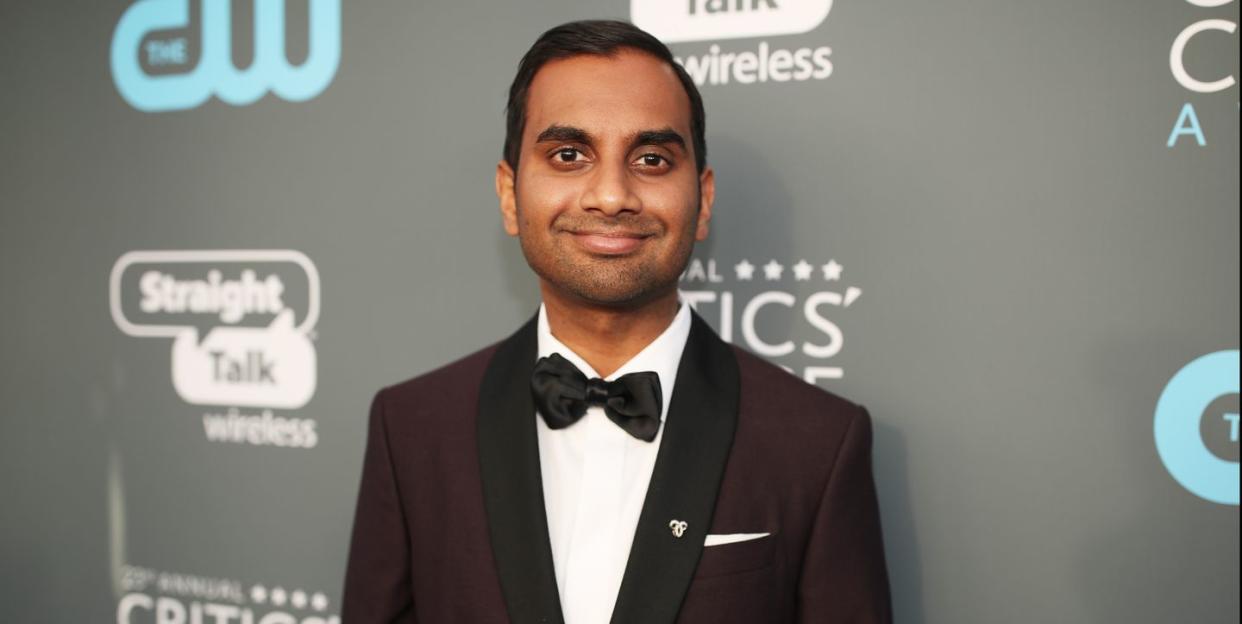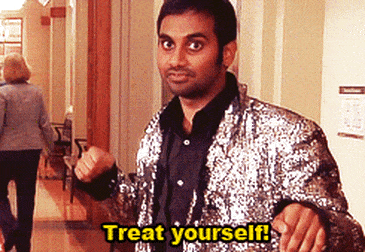Don’t Hate Me, but Aziz Ansari’s Onstage Apology Was...Kind of Good

Back in February, when the news came out that Aziz Ansari was officially ending his post-#MeToo silence and starting to test new comedy material, I had one reaction: an eye roll. Like many other people on the internet, my general feeling is that the men taken down by the movement should stay in their respective lane, which is completely off the road and out of my sight. That included Ansari.
But after watching his “Right Now” standup special, which landed on Netflix this morning, I’m actually not mad about it.
As a quick refresher, Ansari was accused of sexual misconduct in a Babe.net story that went incredibly viral in January of 2018. Grace (not her real name) went on a date with Ansari after meeting him at an Emmy Awards party. She later described it as “the worst night of her life.” After getting dinner together, they went to his apartment, and despite multiple verbal and nonverbal cues that she didn’t want to engage in sexual activity, she felt pressured to do so and ended up performing oral sex on him twice that night.
The piece set off a massive cultural debate about the ethics of the story itself (FWIW, Babe.net is now defunct) and whether or not the incident constituted sexual misconduct or nothing more than a shitty date. It simultaneously broadened the conversation about the more nuanced gray areas of “bad sex” and sparked a ton of criticism that the #MeToo had gone too far. Ansari apologized after the fact, saying he was “surprised and concerned” by the allegations because, according to him, he had already spoken to her privately about it.
It felt hollow, swallowed up in a sea of other “apologies” from men who had made similarly upsetting missteps. (And, yes, “missteps” is a generous term for the bulk of the scandals that came to light during the heyday of the #MeToo movement.)
To be totally transparent, I was definitely an Ansari fan before that Babe story dropped. I loved him on Parks and Rec, and Master of None was my jam. I even read his book, which was literally about how to date in the modern world. But Grace’s story made me realize sexual misconduct is a spectrum. Samantha Bee put it this way: “It doesn’t have to be rape to ruin your life, and it doesn’t have to ruin your life to be worth speaking out about.”
Ansari’s actions weren’t nearly as shocking as, say, Harvey Weinstein’s, but I still wanted to show support for Grace. So I quit Ansari cold turkey.
And that brings us to today and the release of his hour-long Netflix special, which he opens by addressing the controversy head-on:
I’m sure some of you are curious how I feel about that whole situation. And it’s a tricky thing for me to answer ’cause I felt so many things in the last year or so.
There’s times I felt scared. There’s times I felt humiliated. There’s times I felt embarrassed. And ultimately, I just felt terrible that this person felt this way. And after a year or so, I just hope it was a step forward.
It moved things forward for me and made me think about a lot. I hope I’ve become a better person. And I always think about a conversation I had with one of my friends where he was like, “You know what, man? That whole thing made me think about every date I’ve ever been on.” And I thought, “Wow. Well, that’s pretty incredible. It’s made not just me but other people be more thoughtful, and that’s a good thing.” And that’s how I feel about it.
And I know this isn’t the most hilarious way to begin a comedy show. But it’s important to me that you know how I feel about that whole thing before we share this night together.
This is the first thing he says after some funny banter with the audience and a joke about being confused with Hasan Minhaj on the streets of NYC. If you watch him speak, he looks sincere. He speaks slowly, with intention, and his voice gets quiet. He even motions to his heart at one point. Ansari’s behavior is a definite departure from that of the other men in this unfortunate club.
Take Louis C.K., for example, who was accused of sexual harassment and masturbating in front of several women (colleagues!) without their consent. To this day, he consistently uses the allegations against him as a punch line in his comedy routine. Just last month, he told an audience, “If you ever masturbate in front of someone, ask them first. If they say yes, don’t do it!” WTF, dude?
A post shared by @ azizansari on Jul 1, 2019 at 12:03pm PDT
I’m not trying to condone Ansari’s actions, and I’m also not saying this is a perfect apology. He could take more ownership by saying “that I did this” instead of “that this person felt this way,” for example, but there’s no road map for how to come back from a #MeToo allegation. Consider the fact that he could have chosen not to address the allegations during his set at all or that he could have made light of the situation-two paths that would have been undeniably wrong.
But unlike most of his peers, Ansari appears to have thoughtfully reflected on his actions. Given the fact that we can all agree Ansari’s situation was one of the more murky/gray area #MeToo stories, reflection is a good step toward progress and understanding. Of course, none of this erases what happened to Grace, but we should all want there to be a way for men to learn from their misbehavior or from the misbehavior of other men, right?
So yeah, I’m not running to re-binge Master of None or spend money on tickets for his next show, but I’m all for Ansari using his platform to promote the idea that people should be thoughtful during hookups and should reflect on their actions when things go wrong.
Maybe I’ll start to dip my toe back into the Ansari fandom with this GIF. It really comes in handy when justifying my ice coffee habit.

('You Might Also Like',)

